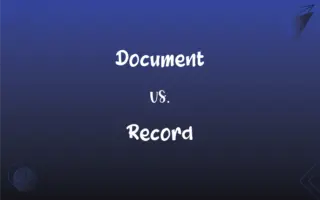Loss vs. Lost: What's the Difference?
Edited by Aimie Carlson || By Harlon Moss || Updated on October 23, 2023
"Loss" is a noun indicating deprivation or reduction, while "lost" is the past tense of the verb "lose," indicating the act of misplacing or not winning.

Key Differences
"Loss" and "lost" are closely related in meaning but differ in their grammatical roles and specific nuances. "Loss" functions as a noun and denotes the act of losing something or the feeling experienced when something is no longer available or has been taken away. For instance, the loss of a loved one can evoke profound sorrow. On the other hand, "lost" acts primarily as the past tense of the verb "lose." When someone says they lost their keys, they are indicating a past event where the keys were misplaced.
When considering emotional or intangible contexts, "loss" often conveys a sense of absence or lack. A business might suffer a financial loss, implying a decrease in profits or revenue. In contrast, "lost" can refer to a state of being. If someone says they feel lost, they might be expressing feelings of confusion or lack of direction.
In literature and daily communication, both "loss" and "lost" have found significant usage. Poets and authors have written extensively about the pain of loss, reflecting the deep emotional void left behind by certain events. Meanwhile, the word "lost" frequently appears in narratives to describe characters who've either physically lost their way or are emotionally adrift.
Furthermore, "loss" has a more permanent undertone. When someone mentions the loss of trust, it implies that the trust once present is now absent and might be challenging to regain. "Lost," being a verb, often suggests action – someone lost their way, their wallet, or an opportunity, hinting at an event that occurred in the past.
While both "loss" and "lost" convey negative connotations, their usage is not limited to somber contexts. In sports, a team might suffer a loss, yet the players might say they lost with dignity, implying a sense of pride in their effort despite not achieving victory.
ADVERTISEMENT
Comparison Chart
Grammatical Role
Noun
Verb (past tense of "lose")
Refers to
The act or state of being deprived
The act of misplacing or not winning
Example of Usage
The loss of wealth
She lost her wealth
Associated Feelings
Often a sense of absence or lack
A past action or state of being
Common Contexts
Emotional, Financial, Physical
Directional, Competitional, Situational
ADVERTISEMENT
Loss and Lost Definitions
Loss
A reduction in amount or value.
The company reported a significant financial loss this quarter.
Lost
No longer existing or being accessible.
The lost traditions of the ancient tribe are being rediscovered.
Loss
The result of a specific event causing reduction.
The storm caused a loss of power in the city.
Lost
Being absorbed or engrossed in something.
She was so lost in the book that she missed her stop.
Loss
The feeling of grief when deprived of something or someone.
The loss of his father was hard on him.
Lost
Past tense of misplacing something.
She lost her pen during the lecture.
Loss
The act of no longer possessing something.
The loss of her necklace was devastating.
Lost
Not knowing one's whereabouts.
He got lost in the woods during the hike.
Loss
The state of being less due to specific circumstances.
There was a loss of interest in the project as time went on.
Lost
Not achieving victory in a contest or battle.
The team lost the championship game.
Loss
The act or an instance of losing
Nine losses during the football season.
Lost
Past tense and past participle of lose.
FAQs
What does "loss" mean?
"Loss" is a noun that indicates deprivation, absence, or reduction of something.
How is "lost" used in a sentence?
"Lost" is primarily used as the past tense of the verb "lose," e.g., "She lost her keys."
Can "lost" describe a person's state of mind?
Yes, saying someone feels "lost" can indicate they're confused or lack direction.
Is "loss" always negative?
Generally, "loss" has a negative connotation, but context determines its exact sentiment.
How do you describe a game result using these words?
You could say, "It was a loss for the team" or "The team lost."
Can "loss" describe a decrease in value?
Yes, e.g., "There was a loss in property value."
Is a "lost opportunity" the same as "loss of opportunity"?
Yes, both phrases denote missed chances, but their grammatical structures differ.
How do "weight loss" and "lost weight" differ?
"Weight loss" is a noun phrase, while "lost weight" uses the verb "lose" in the past tense.
Can "loss" refer to emotions?
Yes, "loss" can denote feelings of grief or sorrow, e.g., the loss of a loved one.
How can "lost" be used in a non-literal sense?
"Lost" can describe being engrossed, e.g., "lost in thought."
Can both words be used in financial contexts?
Yes, e.g., "The company faced a loss" vs. "The company lost money."
Which word can describe feelings of grief?
Both can, e.g., "She felt the loss deeply" or "She lost her grandmother."
Is "lost" always about misplacing items?
No, "lost" can refer to a state of confusion, being defeated, or being engrossed in something.
How do "loss" and "lost" relate in meaning?
While both convey deprivation, "loss" is a noun and "lost" is the past tense of "lose."
How do you use "lost" in a temporal context?
E.g., "He lost a lot of time waiting."
Can "loss" and "lost" be used interchangeably?
No, they serve different grammatical roles and can't always replace each other.
Which term can be associated with past events?
"Lost" is the past tense of "lose," so it often denotes past events.
Which is a noun, "loss" or "lost"?
"Loss" is a noun.
How would you use "lost" in a directional sense?
E.g., "I got lost on my way to the venue."
Is "lost" only used in past contexts?
Primarily, but it can also describe present feelings, e.g., "I feel lost."
About Author
Written by
Harlon MossHarlon is a seasoned quality moderator and accomplished content writer for Difference Wiki. An alumnus of the prestigious University of California, he earned his degree in Computer Science. Leveraging his academic background, Harlon brings a meticulous and informed perspective to his work, ensuring content accuracy and excellence.
Edited by
Aimie CarlsonAimie Carlson, holding a master's degree in English literature, is a fervent English language enthusiast. She lends her writing talents to Difference Wiki, a prominent website that specializes in comparisons, offering readers insightful analyses that both captivate and inform.






































































